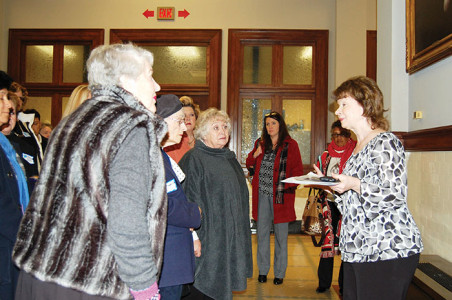
Joy Matthews leads a tour of the state Capitol for Catholic Day at the Capitol.
By Elsa Baughman
JACKSON – Bishop Joseph Kopacz kicked off the 2015 Catholic Day at the Capitol by offering the opening prayer in the House of Representatives at 9 a.m. on Wednesday, Feb. 4. The event honored the 12 Catholic legislators serving at the state Capitol. At 10 a.m., Bishop Roger Morin, Bishop of the Diocese of Biloxi, opened the Senate session with a prayer.
At 12:05 p.m. participants from both dioceses and some of the legislators gathered in the Cathedral of St. Peter the Apostle for Mass and afterwards enjoyed lunch in the parish hall where both bishops recognized the Catholic legislators and made a short presentation.
Bishop Kopacz talked about the teachings of the Catholic Church on social justice. Bishop Kopacz pointed out that the church, since Pope Leo’s XIII encyclical “Rerum Novarum” in 1891 to Pope Francis’ “The Joy of the Gospel” has addressed the condition of the working classes.
After mentioning the seven principals of Catholic social teaching: life and dignity of the human person, call to family, community and participation, rights and responsibilities, option for the poor and vulnerable, the dignity of work and the rights of workers, solidarity and the care for God’s creation, Bishop Kopacz noted that the voices of the prophets cry out in defense of the vulnerable in many ways in every age and certainly in our society today.
“We are here to discuss social justice which works to bring greater life into the communities of our state and our nation,” he said.
Bishop Kopacz urged those gathered to remain active in their communities with a quote from Pope Francis’ Evangelii Guadium on the social dimension of evangelization: “It is no longer possible to claim that religion should be restricted to the private sphere and that it exists only to prepare souls for heaven or relegate to the inner sanctum of personal life, without influence on societal and personal life, without concern for the soundness of civil institutions, without a right to offer an opinion on events affecting others.” (182-183)
In his presentation on “Supporting family unity through social justice” Bishop Morin said we are called to advocate for things such as nutrition, education, housing and healthcare. “We do as much as we can out of charity, but we must also do as much as we can in the pursuit of justice to alleviate the pain and suffering of families and children who are impeded from the goods available to others.” He added that charity can be a minimal response given from a surplus, but justice flows from an obligation to be in solidarity with our brothers and sisters.
The event ended with a tour of the State Capitol led by Joy Matthews.
In a letter to participants, Linda Raff, interim director of Catholic Charities Jackson, wrote, “The public arena, whether it be legislation or public policy, has the profound opportunity to positively impact the lives of all of our citizens particularly those that need a “hand up” to improve their lives and the lives of their families and children. We ask you to remain involved in exploring these issues and gaining knowledge about their impact on our citizenry.
“In doing this important work, you become a sign of God’s love and concern for all people particularly the poor and vulnerable,” she wrote.
Catholic Charities sponsors this annual event. Some years the Poverty Task Force, sponsored by Catholic Charities, picks a particular topic or legislative issue to target and uses Catholic Day to educate people about the issue in hopes of influencing lawmakers. This year the task force did not see any one particular bill or issue in need of attention so the group used the day to honor Catholics who are serving as lawmakers. The Task Force members also want to raise awareness about advocacy on a local level by empowering people across the diocese to engage their lawmakers in discussion. Finally, it’s an opportunity to put into practice the Catholic call to faithful citizenship by deepening the commitment to the cause of promoting gospel values in pursuit of the common good at every level of society.
